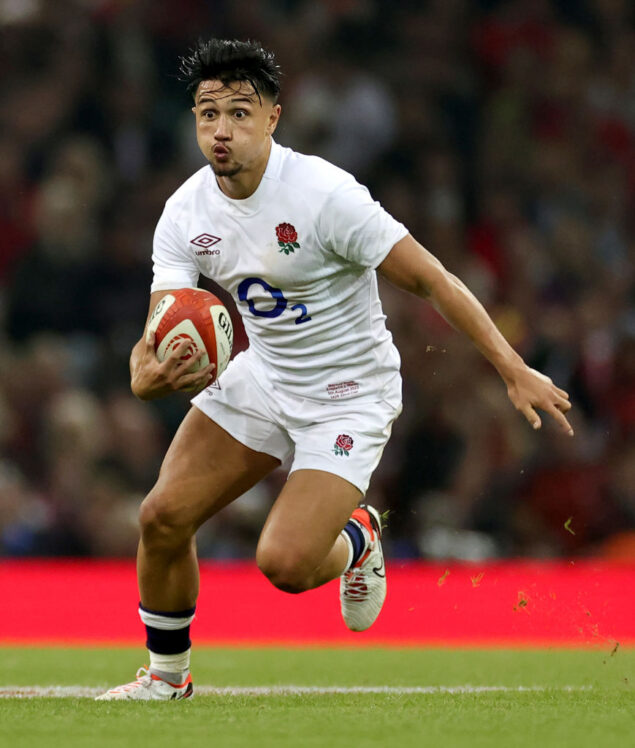Whilst the majority of the talk around England’s squad has been mostly negative in recent times, there’s always a spot for optimism within in the dreary clouds that mirror both England’s recent performances and the atmosphere that follows them.
Fans have recently been discussing whether Marcus Smith repositioning himself as a fullback would be a smart move for the upcoming World Cup.
There’s a huge divide in public opinion regarding the stature of Marcus Smith. Some believe him to be the greatest player since Sliced Bread sped down the wing for England back in the ’70s, whilst others are of the opinion that he’s an overhyped show pony.
Whilst Smith may not be the finished article that Ford or Farrell are, having spent years at the top of their game – the Harlequins player has displayed abilities in the past 3/4 years that you could argue only the likes of Richie Mo’unga and maybe a couple of others in world rugby could match.
At 24, Smith is still on the younger side, but the point needs to be stressed that he is no rookie anymore. In fact, with over 20 caps and almost 200 international points to his name, he is now a fully integrated member of the international set-up.
This World Cup should be Smith’s second chance to put his marker down on the England number 10 position, his first of course being the incredible title-winning season with Harlequins when he made his England debut and was subsequently called up to be a part of the British and Irish Lions tour of South Africa.
His run in the England squad, however, has been cut to periodic showings under Steve Borthwick, with the head coach preferring the experienced and methodical playmaking abilities of George Ford and Owen Farrell. This, as has been displayed so far, has led to a style of play that’s neither winning games nor making them enjoyable to watch.
Captain Owen Farrell will miss the first two World Cup matches, which for Smith, could give him an opportunity to take control of the number 10 shirt.
Borthwick, however, is likely to have other ideas, with his former main man at Leicester, George Ford, being given the nod most recently against Ireland – indicating that he will be the one to provide the cover at 10 whilst Farrell is serving his ban.
Smith has found doubts cast over him at an increased rate since England’s dismal 10-53 defeat at home to France in this year’s Six Nations, for which he copped much of the blame after being selected to start ahead of Farrell. The point that many missed during this match, however, is that much of the blame was unwarranted.
Yes, perhaps his game management could have been better, and his defensive organisation could have taken some looking at, but every time he received the ball he looked sharp and England looked threatening.
With Smith currently being frozen out of the side at fly half, the England squad appears desperate for some inspiration.
This leads us to the question, where does Marcus Smith fit into this England side?
The simple answer, due to the direction the squad is being taken, is nowhere.
Smith does not fit into this style of pragmatic rugby any more so than Israel Folau belongs at Joe Marler‘s birthday party.
Smith is an exciting player that can open up a world full of thrilling potential whenever he receives the ball – able to step anyone, provide inch-perfect kicks, and flick up delicately timed passes off the cuff – not suitable for England.
Borthwick’s side are devout upon running the same simple patterns time after time without variation in an attempt to bully the opposition into submission. None of Smith’s skillsets fit into that.

CARDIFF, WALES – AUGUST 05: Marcus Smith of England runs with the ball during the Summer International match between Wales and England at the Principality Stadium on August 05, 2023 in Cardiff, Wales. (Photo by David Rogers/Getty Images)
England need to completely alter their game plan to build around Smith, or let him go and enjoy pre-season with Harlequins.
Smith was used as a 70th-minute substitution against Ireland on Saturday when he took on the slightly unfamiliar position of fullback, an inspired move it seemed at the time. But looking back at it, what was the point?
Ten minutes is barely enough time for a player to get a foothold in the game, and with Ireland looking so dominant in the attack Smith’s minuscule contribution could easily have caused the player’s confidence more harm than good.
The talk of Smith training as a fullback could well seem like a sensible idea, but given the strength in depth that England have in that position, the endeavour seems pointless.
If Freddie Steward needs to relinquish his position at any stage of the tournament, then Borthwick need only look upon the other players that have played a multitude of professional matches in that position. Max Malins has played there for England in the past, Henry Arundell played at 15 for London Irish, and Elliot Daly played at fullback in the last World Cup final.
The choice to train Smith as a utility fullback serves no other purpose than worst case scenario. Either build a squad and a game plan designed around playing Smith’s style of rugby; or drop him completely.
Sign In